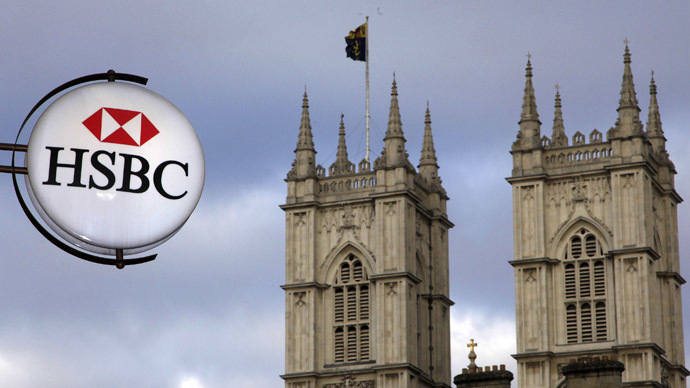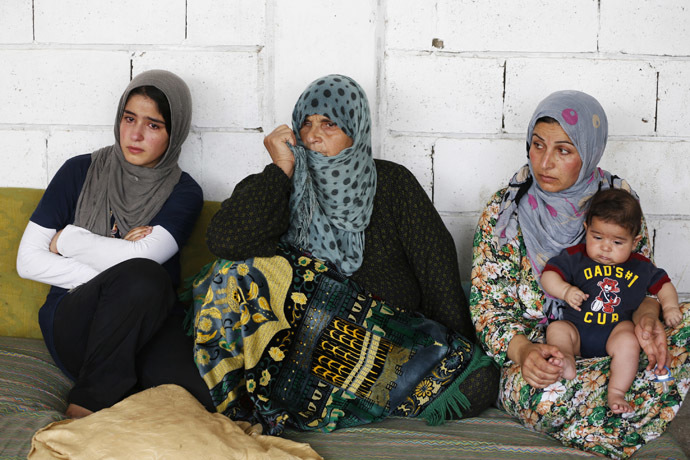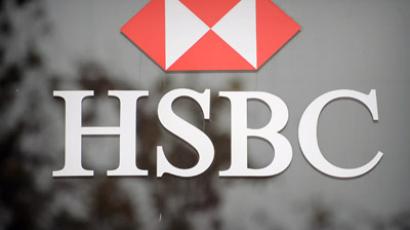HSBC targets account of Syrian refugees in the UK

Banking giant HSBC has been accused of “shamelessly profiling” its customers after it closed bank accounts belonging to Syrian refugees and students in the UK.
HSBC terminates Gaza-linked Islamic charity’s bank account and others
Despite cracking down on its customers with even the most flimsy connection to Islam, HSBC itself has been linked to terrorism financing, including Hezbollah and 9/11 and the laundering of billions of dollars by Latin American drug cartels.
HSBC, branding itself as “the world's local bank,” is increasingly being accused of Islamophobia, after it emerged that the bank is closing accounts of Syrian nationals in the UK. The move comes shortly after the global banking giant closed the accounts of high-profile UK-based Muslim groups.
The British newspaper, the Independent, claims it has documents and email correspondence proving that HSBC had sent letters to Syrian clients in the UK, telling them their accounts would be closed and that they had two months to find a new bank. It cited “increased requirements for compliance with international obligations concerning payments to and from sanctioned countries.” The letters claimed that the decision to terminate their accounts was based on the bank’s “own assessment of risk.”
According to the UK paper, one letter reads: “We appreciate that you will be disappointed by this decision. Whilst we don’t expect you to agree with the decision taken, we hope you understand that such decisions are a necessary part of the management and practices by which HSBC chooses to operate its business.”
“Decisions to end a customer relationship are not taken lightly, and are absolutely not based on the race or religion of a customer,” Steve Gracey, media relations manager at HSBC, said. “There isn’t a blanket policy to close accounts to anyone related to Syria.”
Gracey said the Independent article relied on anonymous sources and made it seem as if there was a blanket approach to closing Syrian accounts, which he strongly denied. He said he could not disclose factors that would play into the decision to close a customer’s account, or how many cases there are in the UK, but he said this has nothing to do with racial profiling. "If a customer has links to countries where international financial sanctions are in place then those links may be looked into,” he added.
One Syrian student, who had his account closed, notes: “The Syrians in Britain have already lost so much back home and are constantly worried about the safety of their families. This adds yet an extra burden that they have to carry around,” according to the Syrian Rethink Rebuild Society and Manchester-based human rights organization RAPAR.
One letter from HSBC to a former customer of Syrian origin reads, “Our records show that you are resident in a country that is subject to financial sanction restrictions.”
This comes days after the banking giant was accused of racism after it closed down the business accounts of two charities, Cordoba and the Ummah Welfare Trust, and a mosque because they fell outside the bank’s “risk appetite.”

HSBC, Hezbollah, 9/11 and drug cartels
In 2013, HSBC agreed to a $32,400 settlement for transferring funds on the behalf of financiers for the Lebanon-based Islamist militant group Hezbollah. The Treasury's Office of Foreign Assets Control concluded that HSBC's actions "were not the result of willful or reckless conduct."
Everett Stern, a former HSBC compliance officer who complained to his supervisors about the Hezbollah-linked transactions, told HuffPost: "Those are my transactions, I reported them." Stern said he saw hundreds of million dollars being transferred. "They admit to financing terrorism and they get fined $32,000. Where, if I were to do that, I would go to jail for life," he said.
In 2012, a Senate report revealed that HSBC’s lax anti-money laundering policies allowed Mexican drug money, Iranian terrorist money, and suspicious Russian money to enter the US. The 300-page report claims that after the 9/11 terrorist attacks in the US, evidence emerged that Saudi Arabia's biggest financial institution, Al Rajhi Bank, and some of its owners had links to financial organizations associated with terrorism. HSBC Middle East was one of several affiliates which continued to work with the bank.
The investigation said the bank had been a conduit for "drug kingpins and rogue nations," and the subcommittee found that by violating several rules HSBC exposed the US financial system to “a wide array of money laundering, drug trafficking, and terrorist financing.” HSBC’s Mexican affiliate channeled $7 billion into the US between 2007 and 2008, according to the report, which possibly included “proceeds from illegal drug sales in the United States.”
HSBC then paid a record $1.92 billion settlement to US authorities.
Soon after in 2013, HSBC announced it would close the accounts of Syrian nationals in the Middle East and North Africa who were not Advance (which require them to maintain minimum balances of $30,000 in their accounts) or Premium ($100,000) customers, claiming that compliance costs made it unprofitable to deal with them.
With financial institutions increasingly coming under intense scrutiny for their money-laundering controls, senior banking officials have voiced frustration that banks are being penalized too harshly for lapses. "Banks have been asked to play the role of policing anti money laundering. That's the real purpose of all these sanctions and surveillance systems and all that," Standard Chartered Asia CEO Jaspal Bindra said in an Reuters interview on Thursday.














